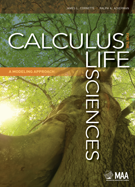Looking for a new calculus textbook? Check out these two just published by the MAA.
 Calculus for the Life Sciences: A Modeling Approach
Calculus for the Life Sciences: A Modeling ApproachJames L. Cornette and Ralph A. Ackerman
Available only as an ebook. PDF price: $35.00
Freshman and sophomore life sciences students respond well to the modeling approach to calculus, difference equations, and differential equations presented in this book. Examples of population dynamics, pharmacokinetics, and biologically relevant physical processes are introduced in Chapter 1, and these and other life sciences topics are developed throughout the text.
The ultimate goal of calculus for many life sciences students primarily involves modeling living systems with difference and differential equations. Understanding the concepts of derivative and integral is crucial, but the ability to compute a large array of derivatives and integrals is of secondary importance.
Students should have studied algebra, geometry and trigonometry, but may be life sciences students because they have not enjoyed their previous mathematics courses. This text can help them understand the relevance and importance of mathematics to their world. It is not a simplistic approach, however, and indeed is written with the belief that the mathematical depth of a course in calculus for the life sciences should be comparable to that of the traditional course for physics and engineering students.
College Calculus: A One-Term Course for Students with Previous Calculus Experience
Michael E. Boardman and Roger B. Nelsen
This textbook is for students who have successfully experienced an introductory calculus course in high school. College Calculus begins with a brief review of some of the content of the high school calculus course, and proceeds to give students a thorough grounding in the remaining topics in single variable calculus, including integration techniques, applications of the definite integral, separable and linear differential equations, hyperbolic functions, parametric equations and polar coordinates, L’Hôpital’s rule and improper integrals, continuous probability models, and infinite series. Each chapter concludes with several “Explorations,” extended discovery investigations to supplement that chapter’s material.
The text is ideal as the basis of a course focused on the needs of prospective majors in the STEM disciplines (science, technology, engineering, and mathematics). A one-term course based on this text provides students with a solid foundation in single variable calculus and prepares them for the next course in college level mathematics, be it multivariable calculus, linear algebra, a course in discrete mathematics, statistics, etc.
Michael E. Boardman and Roger B. Nelsen
List price: $60.00 | MAA Member: $48.00
This textbook is for students who have successfully experienced an introductory calculus course in high school. College Calculus begins with a brief review of some of the content of the high school calculus course, and proceeds to give students a thorough grounding in the remaining topics in single variable calculus, including integration techniques, applications of the definite integral, separable and linear differential equations, hyperbolic functions, parametric equations and polar coordinates, L’Hôpital’s rule and improper integrals, continuous probability models, and infinite series. Each chapter concludes with several “Explorations,” extended discovery investigations to supplement that chapter’s material.
The text is ideal as the basis of a course focused on the needs of prospective majors in the STEM disciplines (science, technology, engineering, and mathematics). A one-term course based on this text provides students with a solid foundation in single variable calculus and prepares them for the next course in college level mathematics, be it multivariable calculus, linear algebra, a course in discrete mathematics, statistics, etc.


No comments:
Post a Comment